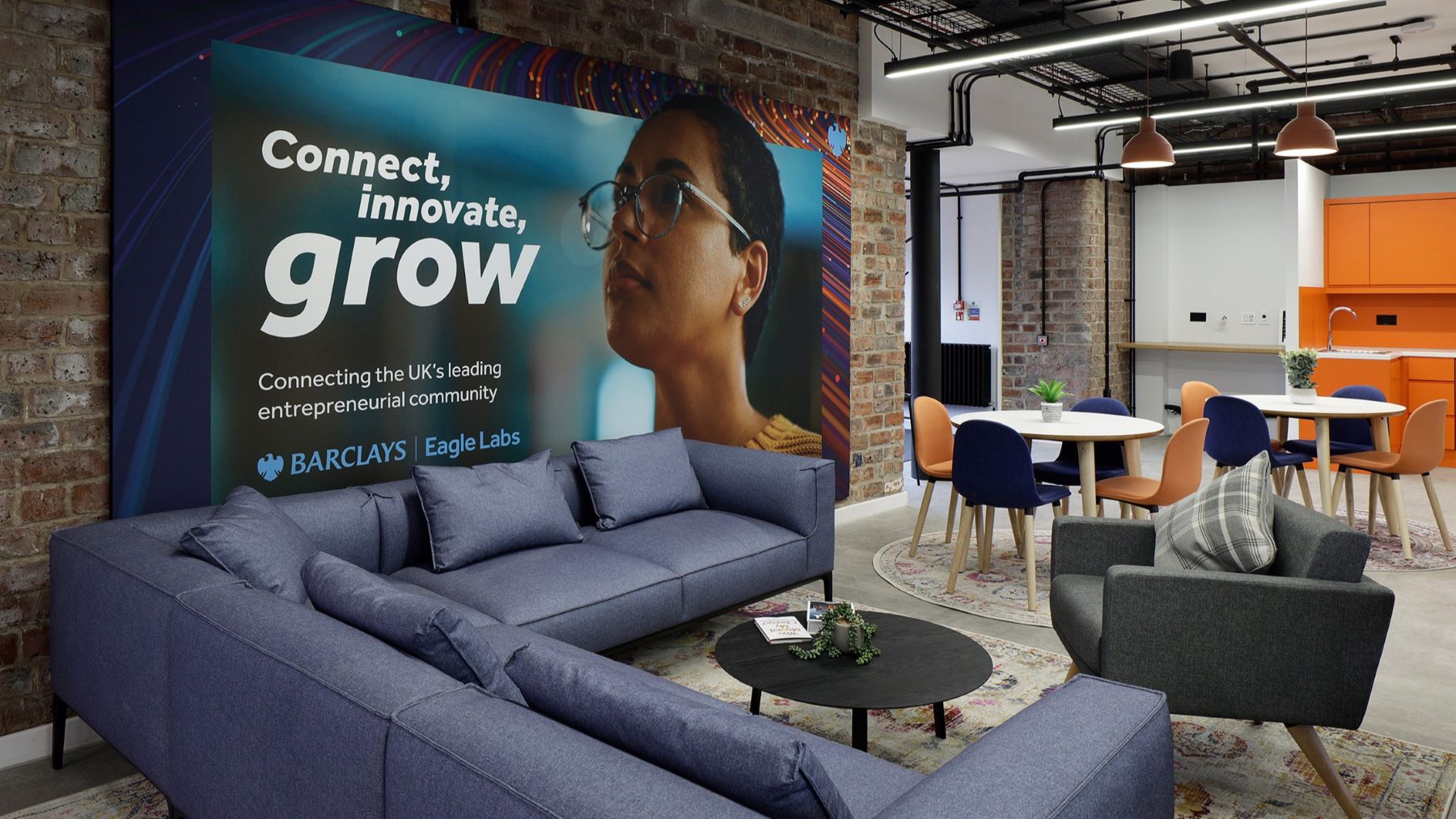
Barclays Eagle Labs has said it is ready to support the UK tech industry and win over critics who think it’s “the bogeyman” after the government awarded it a £12m grant that resulted in Tech Nation shutting down operations.
In January the government awarded Barclays Eagle Labs the Digital Growth Grant – worth £6m per year – to promote the UK’s tech industry.
That decision, which was made by the Department for Digital, Culture, Media and Sport (DCMS) following a competitive tender process, left an insurmountable funding gap in Tech Nation’s finances.
The entrepreneur network subsequently announced it will cease operations on 31 March after a decade of startup support, sparking an outpouring of support from the UK’s tech community.
Many in the UK tech ecosystem have voiced concerns about the government selecting the startup incubator division of a FTSE 100 bank to receive taxpayer funding.
But in a wide-ranging interview with UKTN – the first given by Barclays Eagle Labs since the funding announcement – the person in charge of the bank’s bid has addressed some of the key concerns raised by the UK tech industry.
“I’ve got the impression that some people think Eagle Labs are the bogeymen,” said David Hamilton, head of implementation at Barclays Eagle Labs.
“Folks might not believe us, but rest assured we’ve been getting our hands dirty – personally and the wider team – in the ecosystem for the last seven years, supporting startups and scaleups. We’re not late to the party, we think we’ve been an integral part of the ecosystem for the last seven years.”
Barclays launched Eagle Labs in 2015 to provide tech startup support, mentoring, networking and upskilling. According to figures provided by Eagle Labs, it has supported over 9,600 businesses.
But after navigating a tricky period in which it faced criticism from parts of the same community it is looking to attract to its growth programmes, Eagle Labs has laid out its vision for the next two years – and how it will spend the funding.
“We’re definitely up for the challenge of proving ourselves to the naysayers and the non-believers in the industry that we’ll do a very very good job,” said Hamilton.
How will Eagle Labs use the funding?
A “big chunk” of the grant will go towards education programmes for entrepreneurs, picking up the mantle of the growth programmes run by Tech Nation.
Hamilton said that all of the government grant will be directed to delivery partners to implement these programmes, which will be offered in-person at its 38 physical locations around the UK and virtually. Eagle Labs is currently in the process of selecting those delivery partners.
Most programmes will be “industry agnostic” but there will be some dedicated to sectors that were identified with DCMS – now DSIT – as being of “strategic importance to the UK”.
These include agtech, health tech, digital security, legal tech and others. Eagle Labs is also expanding its diversity programmes, including those for black and female founders.
It is targeting at least 35% of supported founders to come from diverse backgrounds in terms of gender, sexuality and ethnicity.
Eagle Labs said the funding boost will help it support an additional 2,000 businesses per year through its growth programmes and double the number of mentorship sessions it offers to tech firms to 1,500 per year.
Meanwhile, Eagle Labs says it will cover all operational costs, such as the salaries of Barclays staff.
“Any Barclays activity is funded by Barclays and not the Digital Growth Grant. All that money is getting passed on to our delivery partners,” said Hamilton.
Some industry stakeholders have questioned why a bank that reported profits of £5bn in 2022 needs £6m a year in government funding.
Hamilton said that he’d “flip” this view to argue that it represents “great value for the UK taxpayer”.
He said that Eagle Labs will direct public funding down private sector infrastructure to “augment” Eagle Labs’ existing self-funded activity.
A key focus will be on education and “opening younger people’s eyes to the opportunity to become an entrepreneur and providing them with the skills, the thinking, the thought process and the infrastructure to do that,” Hamilton added.
A ‘hyperlocal’ regional focus
Working with startups in tech hubs based across the UK regions is a key focus for Eagle Labs. It has an internal target of ensuring approximately 80% of the businesses it supports are based outside of London.
To help meet this target, Eagle Labs is “ringfencing £1.1m” of the grant for each of the two years for regional partnership programmes. Funds will be allocated to universities, innovation bodies, local authorities or, Hamilton said, to “any body that’s invested in the ecosystem, understands the ecosystem and has a track record of supporting that respective ecosystem”.
He added: “We want to empower those guys to deliver hyperlocal programmes”.
These regional programmes, which will be branded as Eagle Labs partnerships, will run in parallel with the central, location-agnostic schemes.
“The thinking behind the regional partnership programme is that all the challenges and opportunities that are present in the UK tech sector can’t be solved from the centre,” Hamilton explained.
“So we’re really keen to work with hyperlocal partners who are domiciled in the respective regions of the UK, provide funding for those respective regional partners to tackle hyperlocal challenges within their respective ecosystem. Because we believe the regions of the UK are best placed to solve and take advantage of those market conditions.”
Will Eagle Labs take equity in startups?
In the wake of Eagle Labs securing the government grant, some in the tech community raised concerns that Barclays would use its growth programmes to scout for fintech acquisitions, or as a sales funnel for new business banking customers.
Hamilton categorically rejected both these ideas. He said that Eagle Labs will not be taking equity in any of the startups or scaleups that go through its growth programmes, nor will it mandate they use Barclays banking services.
“This is not a tech scout initiative for the bank,” he said. “I imagine there would be cheaper ways to do that activity. That’s not the outcome we’re trying to deliver.”
Nor will Eagle Labs be running fintech-focused programmes. Instead, it is leaving that to Rise, a separate growth network run by Barclays. Rise will not receive any of the government grant, and Eagle Labs is “operationally independent” from Barclays, Hamilton said.
So, what’s in it for Eagle Labs? According to Hamilton, there are two primary motivations. The first is the brand advocacy associated with supporting the UK’s thriving tech startup and scaleup ecosystem.
“Eagle Labs is a real opportunity to evidence the value of how useful Barclays is in UK society, that we do believe we add value other than providing a utility,” said Hamilton. “We do believe it drives brand advocacy.”
The second – and less tangible – reason draws from the macroeconimc theory that a ‘rising tide lifts all boats’.
Hamilton said: “We benefit from a buoyant and growing economy. And we fundamentally believe that economic growth isn’t probably going to come from corporate interventions, it’s going to come from the UK tech sector.”
He added: “This is not a transactional activity for us. We’re not doing this because we want to open another bank account or another banking product. This fundamentally is an investment from ourselves in the economy on the belief that if the economy grows then Barclays will naturally benefit from that.”
What happens after the grant?
Over the last few years, the public funding that DCMS provided to Tech Nation has gradually decreased. That trend is set to continue with the Digital Growth Grant. There will be an opportunity for a third year of the grant, but there is no guarantee and it would be 30-40% less than the current £6m per year.
That means Eagle Labs is already looking at ways to fund its work in a post-grant world.
One revenue stream is connecting corporates “who are ripe for disruption” with startups and scaleups to drive innovation at larger organisations. Eagle Labs will charge the corporates – not the scaleups – to take part in this programme.
“We’re really keen to be able to generate income to fund this delivery programme year three, year four, onwards which doesn’t 100% rely on central government funding,” said Hamilton. “So that’s massively front of mind for us – how do we continue this level of activity post-government funding.”
‘We have two years to prove ourselves’
Eagle Labs programmes funded by the Digital Growth Grant will officially start on 3 April, with the incubator increasing its output over the rest of the year.
“From an Eagle Labs perspective, this is more evolutionary than revolutionary,” said Hamilton. “It’s going to enable more volume […] it’s going to enable us to broaden our proposition.”
In the meantime, question marks remain over how many Tech Nation staff Eagle Labs will take on under TUPE regulations, designed to protect employees when their organisation is taken over. Eagle Labs said it “would not be appropriate” to comment while negotiations are ongoing.
Eagle Labs has also confirmed it will not be taking over the popular Global Talent Visa – a mechanism to attract tech talent to the UK – from Tech Nation when it closes. The visa scheme was not part of the Digital Growth Grant and was organised through a separate arrangement between Tech Nation and the Home Office.
Matching up to Tech Nation’s impact on the UK’s startup ecosystem will be no easy feat. Since it was launched by then-Prime Minister David Cameron in 2010, Tech Nation has had a hand in the development of some of the UK’s most well-known startups, including Revolut, Darktrace and Deliveroo. Its alumni have collectively raised over £28bn.
But the UK’s tech sector is in a very different place now to when Tech Nation first started out. It is much larger and more mature, hitting a $1tn valuation in 2022 and frequently ranking behind only the US and China.
It will require continued support if the UK is to maintain this momentum and deliver on the government’s goal of becoming the “next Silicon Valley”.
Hamilton is bullish that Eagle Labs is the right organisation for this task.
“We have two years to prove ourselves to the ecosystem,” said Hamilton. “In a nice way, we want the ecosystem to be challenging. We believe we’ve got a really good programmatic stack. We believe we’ve got programmes that mitigate and meet the main challenges the UK tech sector has.”
He added: “We’re most definitely not the bogeyman – it’s fundamentally good news for the UK ecosystem.”



